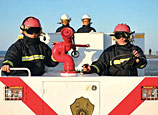
If the burden of environmental protection is a side effect of industrialization and modernization, such a side effect comes earlier in rural areas than the higher quality of life that modernization brings.
This is surely in part because environmental protection pressure in cities propels polluting enterprises to be relocated to remote rural areas. The revenue such industries bring to local finances has blinded some local officials to the potential hazards they pose to the environment.
What has added to this increasingly serious problem is the neglect of environmental factors in the current urbanization drive across the country. Modern agricultural production featuring animal husbandry and the overuse of fertilizers and pesticides has also become a source of pollution.
In its report about the country's environmental situation in 2012 released on Tuesday, the Ministry of Environmental Protection describes the environmental pollution in rural areas as "increasingly protruding".
The report says that industrial pollution exerts increasingly heavy pressure on the rural environment, with sewage and waste from daily life becoming an ever more serious problem in some areas, and drinking water sources and surface water polluted to different degrees.
There are reports that an increasing number of villagers in some areas have been diagnosed with cancer because of the pollutants discharged by industrial enterprises nearby. There are also reports of villagers protesting against proposed factories or local governments because of pollution concerns.
And the recent incidents of rice contaminated with cadmium in South China's Guangdong province and other places show that the impact of environmental pollution in rural areas goes far beyond the countryside.
The discharge of polluted water or other toxic solid wastes will result in groundwater and river water pollution and soil will be contaminated as well. The agricultural products grown on the contaminated soil and watered by toxic water may in turn affect our entire food chain.
The outcome will be disastrous if the rural environment continues to be the price we pay for economic growth today.
Even for the sake of prosperous and safe agriculture, to say nothing of the well-being of rural residents, the rural environment must be protected at any cost.
















 White-collar workers setting up stalls become popular
White-collar workers setting up stalls become popular


![]()
